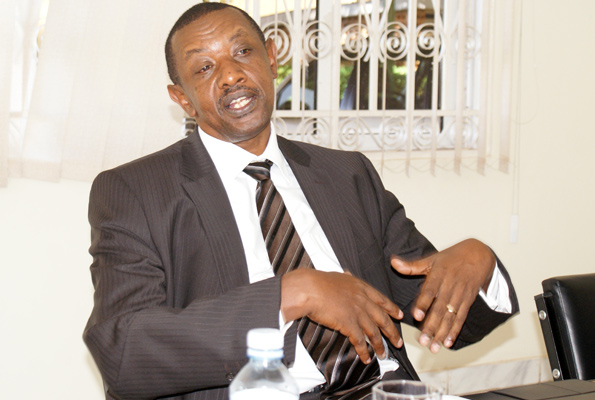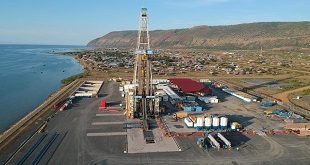
Kampala, Uganda | RONALD MUSOKE | Maj. Gen. (Rtd) Frank Mugambage is Rwanda’s ambassador to Uganda. He spoke to The Independent’s Ronald Musoke on a range of bilateral issues between Rwanda and Uganda.
How would you describe the current relations between Uganda and Rwanda?
Bilateral relations (between states) usually look at a very broad range of issues and these take into consideration building of cooperative arrangements in diverse spheres. When you are doing that even with neighbouring states, you should give it the consideration that there are historical relations involving people and the conduct of these relations are done in a certain way. That is why we are here and that is why Uganda has an embassy in Kigali. For all those relations to be built and maintained, a lot of work has to be put in. One of the areas that have to be taken care of is the fact that we always point out what is working well and what is not; what is going right and what’s going wrong. There is no doubt that over the years, Rwanda and Uganda have developed those mechanisms to deal with those challenges. We have a memorandum of understanding in different sectors including; trade, security, education where our people work together. We even have a framework—the Joint Permanent Commission—which is headed by the two states’ ministries of foreign affairs. These are supposed to meet regularly and make sure the different sectors keep in touch and work for the mutual benefit of the people in the two countries. So (when) you raise issues that you say have been in the media; these are happening in Uganda, they didn’t happen in Rwanda. These are issues that involve the illegal and unjust arrests of Rwandans in this country. We have come to learn about the people who get arrested through very illegal processes, taken to places that even their families don’t know; and there is no communication between the two states. We only discover that those behind the arrests are agents of the Ugandan state because we find information from those arrested that they have been held by institutions of the Ugandan state—particularly the Chieftaincy of Military Intelligence (CMI). People are held there and I am sure you have learnt that some of them have since been extradited with all sorts of stories talking about how they were harassed and tortured. But all this has been happening outside the formal arrangements that were put in place to deal with issues like this. And like I said earlier on, in our effort to build relations, we demand explanations so that these issues do not interfere with the positive things that we are doing together.
So, if I may ask again, what do you think about the current relations between the two countries?
I have told you that the conduct and the building of relations between states is something that is not built on a spark. I have told you that it is a broad reality. Rwanda and Uganda will be here; Rwanda and Uganda are going to be neighbours and Rwanda and Uganda have a long term relationship. Rwanda by the way is not talking about working towards building strong relations with Uganda alone—its immediate neighbour. I think Rwanda is fully committed to the whole idea of the East African Community integration or even African integration. But like I said, to be sure that that works, you also have to come out and talk about what might undermine those positive efforts of building relations.
As Rwanda’s High Commissioner to Uganda, how have you been dealing with these tensions?
We have been engaging the Ministry of Foreign Affairs which is our direct collaborator in Uganda. But we have also engaged with people at different levels including the institutions that are mentioned in these cases, CMI and everybody. This information has been shared and we are trying to follow up.
There have been reports here that some Rwandans with refugee status have been involved in subversive activities back home. What is the truth about these reports?
Well, there are elements of dissidents who try to organise themselves with the intention of trying to do something against the government and people of Rwanda. We have learned that there are elements working with enemies of the government and people of Rwanda, especially those who work with the dissident groups, people who ran away from accountability and other wrong reasons; they formed terrorist organizations like the Rwanda National Congress (RNC) headed by somebody who used to be in the government of Rwanda. In fact, sometime back the same terrorist organization (RNC) threw grenades in Kigali and killed innocent people.That is not to say that these constitute (a threat) to Rwanda because Rwanda is a country that is sovereign and is capable of guaranteeing its national security. But that does not give leeway to people to have a haven where dissidents can come and recruit with the intention of training and conducting terrorism. This is something that must not be allowed to happen; certainly not by a friendly country, and not by a neighbour. I can assure you that Rwanda will never allow that kind of thing to happen.
Rwandan security officials, at least going by media reports, have been abducting some Rwandan nationals and forcefully repatriating them to Rwanda, acts which contravene international law. What explains this sort of action from the Rwandan government?
The question we have asked and we will continue to ask is, why wouldn’t anybody say, let’s find that person (arresting people)? Why wouldn’t people look for those so-called agents and bring them over and say look, this one is so and he has done this and that. It is one thing to claim something, and another to prove. I mean let’s be factual. I can tell you that there is no such a thing that has happened. Whoever is talking about it is may be creating a situation where they can now react by doing the kind of things they are doing. Can we name cases of who has been taken, by who and when? This is what should be happening. I know there is one case that has been mentioned; the case of a one (Joel) Mutabazi who came here as a dissident but had case files in Rwanda. His case was handled through the channels I talked about earlier on. His going back was something that was done under the understanding of the two countries with the involvement of the international legal framework because he had cases to answer. That happened in 2013. So why should it be coming back now to even allege that it was a kidnap? We have even shown it that, yes it was done but it was done through the legal channels and he went through the Rwandan channels and he answered his charges and the Rwandan courts handled him. So we cannot base on that to make a general claim that people are here. Look for them, get them and bring them over.
Since 2011, Presidents Yoweri Museveni and Paul Kagame have worked together to fast-track some of the East African Community’s flagship projects such as the Standard Gauge Railway, the East African Tourism Visa and the national ID for travel across the region. Do you think the current tensions between the two states might have a setback on some of these regional integration projects?
You are making reference to the initiative by our heads of state (Kenya, Uganda and Rwanda) on what was referred to as the (northern corridor projects). This was an initiative out of the realisation that countries of this region needed to work on the infrastructure that would help us mutually benefit from the development process that we are all involved in. You did mention the free movement of people so that citizens of these countries can move without necessarily having passports—this has been accomplished. We have other achievements like removing barriers along the trade routes. Remember that, for example, goods used to take very many weeks from Mombasa to get to Kampala and Kigali. That was reduced to, I think, six days. They were talking about internet connectivity (optic fibre connectivity) and sharing some of the resources such as electricity. So some things have been accomplished while others are still on the way. There is always need to fast-track them; especially for those projects that greatly benefit all of us. But one cannot say that that initiative has stopped, no it hasn’t. And we need to continue to engage and see how it goes.
We recently saw Uganda’s Foreign Minister, Sam Kuteesa, travel to Kigali to meet the Rwandan president. Is this one of the signs of a return to normal relations between the two states?
I did not attend the meeting myself but the Rwandan Foreign Affairs ministerstated that the president of the Republic of Rwandareceived Sam Kutesa, Uganda’s Foreign Affairs minister with a message from President Museveni and they had a good discussion mainly on integration. President Kagame stressed that for integration to be successful, there has to be something for everybody— all partners must win. They further had discussions linked to the state of bilateral relations, including the continuing arrests and disappearance of Rwandan citizens in Uganda which are causing tension and many Rwandan families to petition their government to intervene on behalf of their loved ones.
What’s your reaction to the issue of the Rwandan refugees currently living in Uganda who we are meant to understand will be repatriated to Rwanda very soon after Rwanda invoked the UNHCR’s cessation clause?
The cessation clause is under the UN system which means that people who have left their country to seek refuge (elsewhere) can return home once the conditions that made them flee are no longer there. In the case of the UNHCR, it stops extending assistance to these people because it has no basis and for the case of Rwanda, that process has been examined for those people who left between 1959 and 1998. It is the UNHCR that came to the conclusion that, yes, we think Rwandans should not have refugee status because the conditions that existed at the time no longer exist and there is no justification for them to continue being refugees. That is when the UNHCR set the date for the application of the cessation clause. That cessation clause came into effect on 1 January 2018. In other words, for the Rwandan refugees who left Rwanda in 1959 and 1998, there is no justification for them to be considered refugees anymore and the UNHCR will withdraw its support. But what happens is that the host country could consider it appropriate to give these people permanent residence or citizenship. Those are all considerations. But the bigger issue is that Rwanda accepts and Rwanda has always been open and we have had very many former refugees returning. So, the doors are open and the facilitation is there for those who might want to come back home.
Your last word?
It is extremely important to emphasize the fact that Rwanda is very committed to building and reinforcing mutually beneficial relations in the neighbourhood. You are aware that in fact His Excellency our president has been given the responsibility to head the African Reform Agenda and this year, Rwanda is also taking on the Chair of the African Union. We are all for unity and solidarity, not only here but beyond. So anything that undermines that is something we take seriously and should not be allowed to happen.
 The Independent Uganda: You get the Truth we Pay the Price
The Independent Uganda: You get the Truth we Pay the Price


